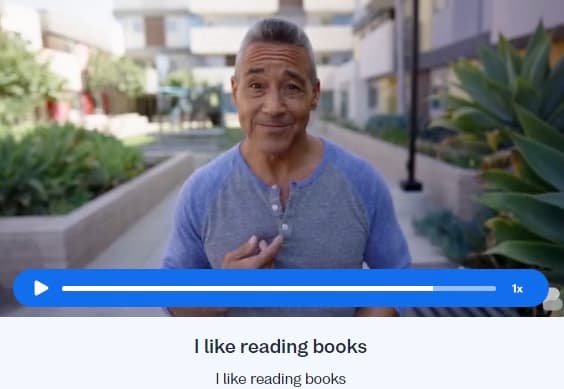I want to learn...
Author:

Barney Meekin
If you’re looking for an effective way to learn a language, you can’t go wrong with reading.
Reading is one of the best ways to learn a language. But practicing your English reading skills isn’t as simple as picking up a book and relaxing on the sofa — you need to engage with text to get the most benefits.
In this article, you’ll learn 15 tips to help you properly engage with whatever you read.
Improve your English reading skills with these 15 tips
1. Identify your reading level
Before you can do anything, you need to know your current level. This is the starting point for improving your reading skills. It’ll tell you what texts to choose and what activities to do. If you already know your level — maybe you recently took a test — then great, you can move on to the next tip.
If you don’t know your level, you need to self-assess your reading skills. Don’t worry, this doesn’t need to be 100% accurate. You can make a rough estimate using the CEFR proficiency levels and its self-assessment grid. Be honest about your level here and it’ll help you get the most out of your English reading practice.
2. Set clear goals
Good goal setting is important for language learning because goals have such a huge effect on motivation. If you set unrealistic goals and you miss the target, your motivation takes a hit. So make sure you set realistic goals.
One of the most popular frameworks is SMART (Specific, Measurable, Achievable, Relevant, Time-bound) goals. For example, set yourself a goal of reading a specific number of pages or chapters each day, learning a set number of new vocabulary words per week, or trying out a new genre or style of content each month.
Only choose goals that you know you can commit to. But don’t make them too easy. Getting the balance right can be tricky. Make your goals possible to achieve but challenging enough that when you achieve them, you get a sense of accomplishment.
3. Choose the right materials
Choose materials that match your goals, level, and interests. If you enjoy fiction, for example, read graded readers of novels. If you’re studying English for work, read online business news. By choosing subjects that match your interests and needs it’s easier to stay motivated.
Also, be careful about the difficulty of texts. Choose materials that are at — or slightly above — your current reading level. Again, it should be challenging but not so difficult that it causes frustration.
Busuu has exercises for reading comprehension that can be easily accessible via the app on both mobile and desktop. Choose varying levels from different courses on Busuu and get to read dialogues, short stories and a lot more that will not only help you level up with your reading skills, but learn a new language as well!
Tip: If you want to do a reading practice or lesson on the go, you can download reading materials and exercises on Busuu and read them even without an internet connection or if you are offline.
4. Read a bunch of different materials
It’s easy to stay in your comfort zone. If you’re used to reading English news articles, it can be daunting to try reading fiction. But you should read a variety of texts, such as books, newspapers, magazines, and online and blog articles. They all have different types of vocabulary and writing styles so you get a well-rounded and comprehensive reading practice.
5. Engage with different genres
It’s good to read a bunch of different genres too. Explore fiction, non-fiction, science fiction, fantasy, biographies, histories, investigative journalism, etc. By mixing things up like this, you keep your practice sessions fresh and interesting. Each genre also introduces you to different lexicons, themes, styles, and structures.
6. Practice consistently
Build a consistent reading habit you can stick to. 15 minutes per day might not sound like a lot but that’s about 90 hours a year. That’s a lot of reading practice. If you tried to cram all that practice into just the weekends, you’d need to read for two hours every weekend for a year to hit 90 hours. That’s much harder to stick to than 15 minutes per day.
Little and often is a great way to build a consistent, and manageable habit. Remember, 15 minutes per day is the minimum. If you’re enjoying a book so much that you get into a reading flow, don’t stop. It’s impossible to read too much.
7. Read extensively and intensively
Different kinds of reading have different effects on language acquisition. Extensive reading is when you read a lot of easy and interesting texts with a focus on overall meaning. When you read in this way, you learn a language naturally — similar to how you learned your first language.
Intensive reading is when you read shorter and more challenging texts with a focus on language features. You analyze the text and the language. This is the most common kind of reading language learners do — you probably did this in language classes at school.
There are benefits to both of these approaches so why not mix them together? That way you’ll get a well-rounded reading practice.
8. Practice active reading
This might sound obvious, but when you’re reading, pay attention. Focus on the text. Don’t be passive. Here are some ways you can be engaged with the content you read.
Take notes. Write down new vocabulary, key points, and any questions or reflections you have about the text. Reviewing your notes reinforces what you learn and it makes sure you’re paying attention to the text. You can check out new vocabulary terms on Busuu’s Vocabulary Trainer.
Ask questions. This is a really simple way of staying engaged with the text. Ask questions about the text, characters, and storyline.
Make predictions. When you’re reading, take a guess at what you think will happen next. You can do this on a chapter-by-chapter basis. Or you can try and guess the ending. What’s important is that you’re not being passive. Take an active part in the experience by making predictions.
9. Write summaries
After finishing a text, write a brief summary of what you've read. This exercise allows you to review what you read — and you get to practice writing skills. Here’s a quick tip: If you want to focus on understanding the gist, make the summary short (even one sentence). If you want to focus on understanding the details, make the summary longer.
Channel your inner critic and add your opinion to the summary too. You can use this to recommend texts to other people in your language-learning community.
10. Practice skimming and scanning
Skimming and scanning are important reading skills — especially if you want to take a test with time limits. Skimming means quickly reading through the text to understand the main idea while scanning involves searching for specific information within the text. When skimming or scanning you don’t need to read every word. Focus on the information you want to understand (the gist or the details) and search for it in the text.
11. Visualize
Create mental images of the scenes, characters, and events described in the text. This brings the text to life, making it easier to understand and remember the content (and makes it more fun).
12. Read and listen at the same time
Reading and listening at the same time is a great activity for language learners. Combine audiobooks with the books you read. If you read online resources and not books, give text-to-speech functions a try. This activity helps your reading skills, of course, but it’s also great for listening and pronunciation skills.
13. Join a reading group
Reading isn’t just about reading. Reading is also about discussing what you’ve read. This might not directly influence your reading skills (but will help your speaking and writing skills). A great way to do this is by joining a reading group. You get to interact with other people, engage with what you’ve read on a deeper level, and get different points of view about the content.
You can also share the books you have read or get good recommendations with fellow readers who are part of the Busuu community. This will be beneficial for you if you are also learning a new language and want to read a recommended book by a native speaker of that language.
14. Look for context clues
What do you do when you come across a new word or structure? Probably, you reach for your translator app. But before you do that, try and figure out the meaning on your own (you can always check the dictionary later).
Context clues help understand the meaning of unfamiliar words and phrases. They’re hints in the sentence or paragraph that help your understanding. So pay attention to the words and sentences that come before or after the new word. They might give you the clue to unlocking its meaning.
15. Review and reflect
When you finish a text, the learning still continues. Don’t forget about the text right away, reflect on it. Think about what you've learned and how it relates to your life. If the text was challenging, think about why. This can identify areas you need to practice in the future. You can also reread and review parts that you enjoyed. Or parts that you couldn’t understand well.
Master English reading skills
If you follow these tips, you’ll be well on your way to achieving your English reading goals. Be consistent and enjoy the process because reading is one of the most meaningful things you can do to learn a language.
AUTHOR

Barney Meekin
Newlanguages


